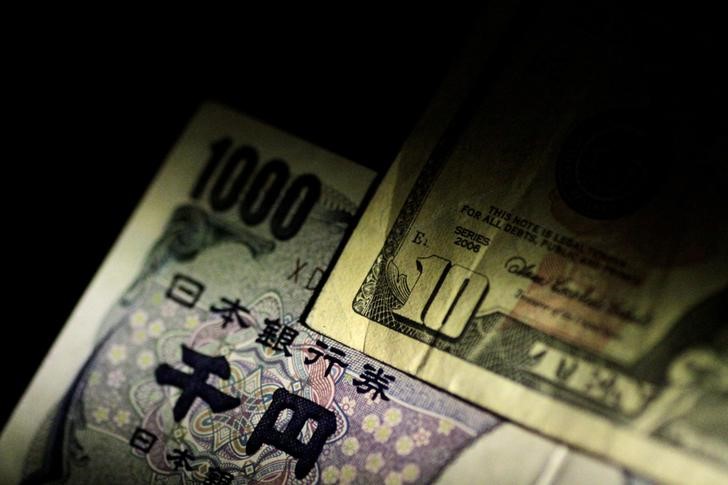 © Reuters. Ilustration photo of U.S. dollar and Japan Yen notes
© Reuters. Ilustration photo of U.S. dollar and Japan Yen notesBy Hideyuki Sano
TOKYO (Reuters) – The yen held firm against the dollar on Tuesday as a political scandal engulfing Japanese Prime Minister Shinzo Abe’s government raised doubts about his ability to continue to pursue his economic policies, including monetary easing.
The yen traded at 106.35 per U.S. dollar
The Ministry of Finance admitted on Monday it altered documents related to a discounted sale of state-owned land to a school operator with ties to Abe’s wife.
The suspected cover-up could slash Abe’s ratings and dash his hopes for a third term as leader of his Liberal Democratic Party (LDP) in LDP leadership vote in September.
That in turn has cast doubts over Abe’s signature reflationist polices, which he’s pushed since his election in 2012 and include efforts to cheapen the yen.
Other major currencies were little change in early Tuesday trade, with the U.S. CPI data due at 1230 GMT seen as a key focus for the day.
The median forecasts by economists polled by Reuters points to annual core CPI inflation of 1.8 percent in February, which would be flat from January.
A higher reading could stoke expectations that the Federal Reserve will likely raise interest rates four times, rather than three times, this year.
A rate hike at its upcoming policy meeting on March 20-21 has been long considered a done deal while another increase in June is almost fully priced in.
Yet traders are also mindful that the prospects of more U.S. rate hikes, while theoretically positive for the dollar, may not necessarily lift the U.S. currency, given other factors weighing on the greenback.
One big issue is U.S. President Donald Trump’s tariff on steel and aluminum, which many investors worry could trigger retaliatory moves by U.S. trade partners and hurt the economy.
On diplomatic front, the surprise announcement last week that Trump plans to meet North Korean leader Kim Jong Un, boosted risk appetite, but North Korea has stayed mum.
The euro () traded at $1.2335, having lost steam since Thursday when European Central Bank President Mario Draghi struck a cautious tone on the euro zone economy.
While acknowledging faster growth in Europe, Draghi said regional inflation remained subdued and rising protectionism is a risk, leading traders to think that the ECB will advance slowly in winding back its stimulus.
Fusion Media or anyone involved with Fusion Media will not accept any liability for loss or damage as a result of reliance on the information including data, quotes, charts and buy/sell signals contained within this website. Please be fully informed regarding the risks and costs associated with trading the financial markets, it is one of the riskiest investment forms possible.
Source: Investing.com





























